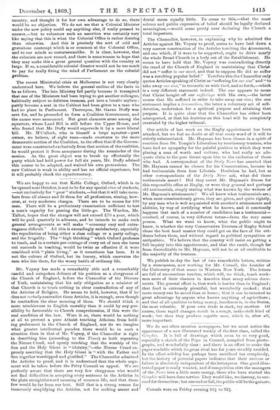The Chancellor, however, in explaining why he admitted the Articles
against Mr. Voysey to proof, seems to have laid down a very narrow construction of the Articles touching the Atonement, and one which, if it were to be supported, ought to drive nearly the whole Broad Church in a body out of the Establishment. He seems to have held that Mr. Voysey was contradicting directly the creed of the Church of England in maintaining that Christ did not " suffer in our stead, and that to suppose He did so suffer was a revolting popular belief." To refute this the Chancellor only quotes Articles speaking of Christ as "suffering for our sins" and " to take away our sins," to reconcile us with God, and so forth,—which is a very different statement indeed. The one appears to mean that Christ bought off our sufferings with His own,—the latter means that He suffered in order to take away our sins; the one statement implies a transaction, the latter a voluntary act of self- devotion, undertaken for a spiritual purpose and attaining that purpose. It is quite clear that the Chancellor has either been misreported, or that his doctrine on this head will be completely overruled by the higher tribunal.


































 Previous page
Previous page